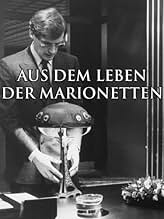CALIFICACIÓN DE IMDb
7.2/10
5 k
TU CALIFICACIÓN
Un recuento de eventos antes y después de un homicidio cometido por un hombre de negocios perturbado en un tenso matrimonio, y qué lo motivó a cometer ese acto atroz.Un recuento de eventos antes y después de un homicidio cometido por un hombre de negocios perturbado en un tenso matrimonio, y qué lo motivó a cometer ese acto atroz.Un recuento de eventos antes y después de un homicidio cometido por un hombre de negocios perturbado en un tenso matrimonio, y qué lo motivó a cometer ese acto atroz.
- Premios
- 1 premio ganado en total
Paul Bürks
- The Assistant in the fashion show
- (sin créditos)
- Dirección
- Guionista
- Todo el elenco y el equipo
- Producción, taquilla y más en IMDbPro
Opiniones destacadas
This is totally engaging but its almost just theater: the long scenes, still camera, monologues, exposition of internal psycho-drama and chapters that structure the entire film.
But most of all its the interest and compassion contained in the human face and voice that Bergman makes central. That had been part of Bergman's work for a long time, just look at "Through a Glass Darkly". The characters are moving through space but not able to connect with each other at all, they simulate free will but they are not able to live it.
Having said all of the above the photography and set ups are occasionally sublime, the sort of thing that was the essence of cinema, but not so any more.
But most of all its the interest and compassion contained in the human face and voice that Bergman makes central. That had been part of Bergman's work for a long time, just look at "Through a Glass Darkly". The characters are moving through space but not able to connect with each other at all, they simulate free will but they are not able to live it.
Having said all of the above the photography and set ups are occasionally sublime, the sort of thing that was the essence of cinema, but not so any more.
A complex dissection of a murder and a murderer, told by jumping back and forth in time, before and after the event, A deeply disturbing portrait of a man and a society so cut off from feeling that violence seems almost inevitable.
While more divided in public reaction then some of Bergman's most beloved works, I think this edgy, bold, uncomfortable film ranks close to some of his best work. While there are moments of pretension, there's also a lot of human and psychological complexity (and wonderful acting) in this bleak exploration of how near murder and madness lie to any of us.
While more divided in public reaction then some of Bergman's most beloved works, I think this edgy, bold, uncomfortable film ranks close to some of his best work. While there are moments of pretension, there's also a lot of human and psychological complexity (and wonderful acting) in this bleak exploration of how near murder and madness lie to any of us.
Ingmar Bergman's From the Life of the Marionettes, his last film done while in exile during the late 70's, hearkens back to his experimental period in the mid to late 60's. Here he's trying for a deconstructive way to get inside the mind of his subjects, most notably the character of Peter Egermann. The fatal flaw of the film, however, is also something that adds an unusual kind of connection to the material for a Bergman film. It's erratic in its narrative as the director tests himself with jumping around from different times around a single event. But unlike how this has been done by the likes of Tarantino, this is meant not really as a useful story trick, but to try to get different perspectives and acute angles of the subject at hand. The film doesn't reach its greatness for the same reason that it does keep itself watchable- this is very murky, depressing times, loaded with dialog that may or may not go ways to help explain or give some interest in the supporting/main characters, and some startling, if dated, surreal experiences.
It's also a little strange that Bergman decided to connect these characters, however loosely, to the couple in the first episode of the Scenes From a Marriage series, where Peter and Katarina (then played by Jan Maljsmo and Bibi Andersson) were the volatile arguers who juxtaposed the main focus of the film. Here, portrayed by Robert Atzorn and Christine Buchegger, are not only not as spot-on as the former actors (though they are still quite good and splendid in some scenes), the couple is picked under Bergman's psychological microscope where the relationship is very strained and a fatalistic. The opening scene is definitely a mind-blower, with an intensity and harsh sexual edge that is uncommon to Bergman's films (one of his best openings to be sure). Indeed, one of the nice twists, a little shocking at first and then intriguing, is how the filmmaker lets out inhibitions and shows the more explicit images of nudity and the sensual, as well as rock and disco music.
Along with a fragmented approach to the storytelling, where infidelities, insecurities, shame, depression, and outright rage and confusion are brought out in segments that range from the convincing to missing the mark. In a way, maybe Bergman's aims are lowered this time in exile, and he delves more into a doomed personality with visual surprise. Sven Nyvkist, as usual, is still very good with what he does in the frame, especially as this is 90% black and white (with a strange blue tint at times), and his services come into great use in a visual detailing of a dream involving Peter and Katarina naked in a wide, white space. It's maybe the best sequence in the film. In experimenting with the dramatic interpretations, it's not as successful, and some of the supporting actors aren't as good as the leads (a scene with one of the actors talking into a mirror is one of my least favorite scenes Bergman's ever wrote/directed).
Its obscurity is not, therefore, that staggering to see. But it is a good and occasionally spine-tingling character study, and if you are into the filmmaker's work already it's a find that might prove better or more fulfilling. 7.5/10
It's also a little strange that Bergman decided to connect these characters, however loosely, to the couple in the first episode of the Scenes From a Marriage series, where Peter and Katarina (then played by Jan Maljsmo and Bibi Andersson) were the volatile arguers who juxtaposed the main focus of the film. Here, portrayed by Robert Atzorn and Christine Buchegger, are not only not as spot-on as the former actors (though they are still quite good and splendid in some scenes), the couple is picked under Bergman's psychological microscope where the relationship is very strained and a fatalistic. The opening scene is definitely a mind-blower, with an intensity and harsh sexual edge that is uncommon to Bergman's films (one of his best openings to be sure). Indeed, one of the nice twists, a little shocking at first and then intriguing, is how the filmmaker lets out inhibitions and shows the more explicit images of nudity and the sensual, as well as rock and disco music.
Along with a fragmented approach to the storytelling, where infidelities, insecurities, shame, depression, and outright rage and confusion are brought out in segments that range from the convincing to missing the mark. In a way, maybe Bergman's aims are lowered this time in exile, and he delves more into a doomed personality with visual surprise. Sven Nyvkist, as usual, is still very good with what he does in the frame, especially as this is 90% black and white (with a strange blue tint at times), and his services come into great use in a visual detailing of a dream involving Peter and Katarina naked in a wide, white space. It's maybe the best sequence in the film. In experimenting with the dramatic interpretations, it's not as successful, and some of the supporting actors aren't as good as the leads (a scene with one of the actors talking into a mirror is one of my least favorite scenes Bergman's ever wrote/directed).
Its obscurity is not, therefore, that staggering to see. But it is a good and occasionally spine-tingling character study, and if you are into the filmmaker's work already it's a find that might prove better or more fulfilling. 7.5/10
A short comment - enjoyed this and it is up to the usual Bergmann standards. As with many of his other films sticking with some of the difficult opening scenes rewards the viewer later with a thought provoking account of one man's depression leading to violence and murder. In many ways Bergman is the jacques costeau of the film world, exploring the deep seas and bringing up to the surface what lies below!
Bergman was on top form writing this piece - there's lots to think about. What motivates a respectable man, whose mental state indicates only a small risk of self-harm, to undertake such a violent and frenzied crime? Do the ulterior motives and actions of those around him (wife, shrink, wife's business partner...)deliberately or unwittingly trigger the crime - or indeed are those sub-plots entirely incidental to the central event? These questions are not answered - they are raised and illuminated.
This is not Bergman's greatest piece of cinema - the mixture of documentary, drama and flashback can be a little disorienting - but the argument of the film drives on relentlessly and it is compulsive watching. Well worth seeing.
This is not Bergman's greatest piece of cinema - the mixture of documentary, drama and flashback can be a little disorienting - but the argument of the film drives on relentlessly and it is compulsive watching. Well worth seeing.
¿Sabías que…?
- TriviaDe la vida de las marionetas (1980) is Director Ingmar Bergman's only movie shot in the German language. El huevo de la serpiente (1977) was shot in Germany, too, but mostly in English.
- ConexionesFeatured in Drugoe Kino: From the Life of the Marionettes (2006)
- Bandas sonorasTouch Me, Take Me
Performed by Rita Wright
Selecciones populares
Inicia sesión para calificar y agrega a la lista de videos para obtener recomendaciones personalizadas
Detalles
- Fecha de lanzamiento
- Países de origen
- Idioma
- También se conoce como
- From the Life of the Marionettes
- Locaciones de filmación
- Productoras
- Ver más créditos de la compañía en IMDbPro
Taquilla
- Total a nivel mundial
- USD 4,293
- Tiempo de ejecución1 hora 44 minutos
- Color
- Mezcla de sonido
Contribuir a esta página
Sugiere una edición o agrega el contenido que falta

Principales brechas de datos
By what name was De la vida de las marionetas (1980) officially released in India in English?
Responda




























